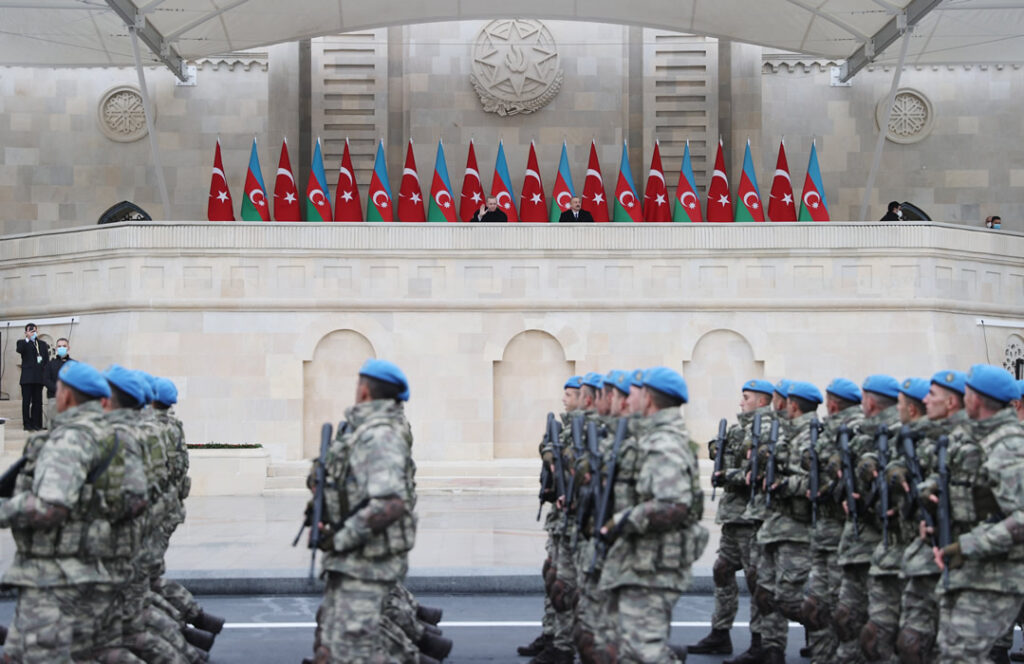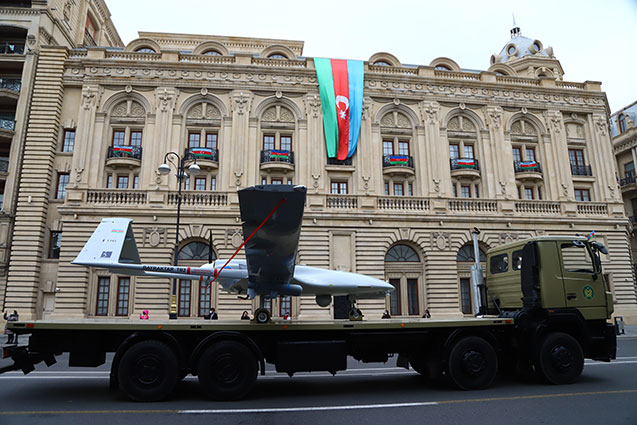Nordic Monitor
Turkey is aiming to step up defense industry cooperation with Central Asian countries by exporting its armed drones (unmanned aerial vehicles, UAVs), which have been tested on real battlefields.
The Turkish government is considering Central Asian countries as potential partners to purchase its combat drones, a recent briefing of the Turkish Parliament’s Foreign Affairs Committee has revealed. Central Asia is an important market for Turkish defense suppliers, and defense industry cooperation is seen by Turkey as a fundamental element of a larger trade framework.
“Our goal is to ensure the wide use of our defense industry products, from unmanned aerial vehicles to software and ammunition developed by Turkey, in Kazakhstan and other Central Asian countries,” Deputy Foreign Minister Yavuz Selim Kıran told lawmakers in the committee meeting held on December 2, 2020.
Kıran briefed members of the Turkish parliament on the Turkey-Kazakhstan military cooperation agreement that was signed in 2018 and is awaiting the committee’s approval.
Turkey is willing to renew its military framework deals with Kyrgyzstan, Turkmenistan and Uzbekistan, and the Turkey-Kazakhstan agreement has become a significant step to further develop the Turkish government’s defense cooperation with other regional countries, Kıran stated.
Page five of the committee meeting minutes:
Since 2015 Turkey has been a key market for the purchase of armed drones such as the Bayraktar TB2 and the TAI Anka, which have proven their capabilities in Syria, Iraq and Libya and in the recent conflict between Armenia and Azerbaijan. The Bayraktar TB2, manufactured by Turkish company Baykar Makina, successfully test-fired a rocket for the first time in December 2015.
The Bayraktar TB2 launching MAM-L and MAM-C missiles proved adept at destroying targets in those cases. Turkey has reportedly been using its Koral jamming system built by Aselsan to degrade the effectiveness of air defense radars.
Azerbaijani President Ilham Aliyev has repeatedly confirmed the use of Turkish drones against Armenian targets and praised the contribution of Turkey’s armed drones to the Azerbaijan army.
Turkey previously used its drones to great effect in its military operations. In Nagorno-Karabakh, the TB2 likewise performed well in targeting and destroying enemy defenses. Turkish armed drones were exhibited yesterday at Azerbaijan’s victory parade in Baku.
Selçuk Bayraktar, President Recep Tayyip Erdoğan’s son-in-law and chief technology officer at Baykar Makina, told local media in September that the company has exported drones to four countries but did not elaborate.

Kıran informed Turkish lawmakers of Turkey’s defense industry investments in Kazakhstan and deepening bilateral defense industry cooperation with the Central Asian country over the last decade.
Nordic Monitor previously released the text of the Turkey-Kazakhstan military cooperation agreement, which was signed after the third meeting of the High Level Cooperation Council, held in Ankara on September 13, 2018. According to the agreement both countries have pledged to cooperate in the defense industry; military intelligence sharing; participation in joint exercises and training; logistics cooperation, grant and logistics support; communications, electronics, information systems and cyber defense; peacekeeping and humanitarian aid operations; and information and experience sharing on nuclear, radiation, biological and chemical protection.
The two countries have also committed themselves to focusing on military training and education, military medical and health services, military law systems, mapping, hydrography, topography and navigation, exchange of military personnel and units, information and experience sharing on military and technological research, and carrying out training programs on mines and improvised explosive devices.
In April Aselsan inked a deal with Kazakhstan to purchase a remotely controlled weapons systems (SARP) through its subsidiary in the Central Asian country, Kazakhstan Aselsan Engineering (KAE). According to the agreement Aselsan will deliver to Kazakhstan its SARP advanced remote controlled stabilized weapon station (RCWS) in the ‘‘SARP-DUAL’’ configuration later this year. SARP-DUAL is an extension of Aselsan’s existing SARP system.
Turkey and Kazakhstan co-founded KAE in 2011, and the company began operations in late 2013 with a $44 million investment.
Aselsan, part of the Turkish Armed Forces Foundation (TAFF) and controlled by the Turkish government, is the largest defense company in Turkey and is among the top 100 defense contractors globally. The company has a wide range of products including communication and information technologies, radar and electronic warfare, electro-optics, avionics, unmanned systems, land, naval and weapon systems, air defense and missile systems, command and control systems, transportation, security, traffic, automation and medical systems.

Amid an economic crisis and the COVID-19 pandemic, Turkey’s defense industry exports decreased by 18.4 percent in January-November 2020 compared to the same period last year, according to data shared by the Turkish Exporters Assembly (Türkiye İhracatçılar Meclisi, or TİM).
According to TIM figures, the total arms exports of the Turkish defense and aerospace industry dropped sharply to $2 billion. The total sales of Turkish defense conglomerates were $2.452 million in the same period last year.
Turkey’s growing defense industry had made important progress in the export arena in previous years; the industry, however, faces a number of challenges this year. In addition to the pandemic and financial problems, the Turkish government cannot easily obtain foreign subsystems to equip its platforms due to the arms embargoes imposed by some Western countries and defense giants.
Several countries, including France, Finland, Norway, Sweden, the Czech Republic, the Netherlands, Spain and Germany, imposed arms embargoes on the Turkish government after its troops entered Syria to attack Kurdish militia in October 2019.
In August the US-based Defense News magazine listed seven Turkish defense companies — military electronics specialist Aselsan, Turkish Aerospace Industries, armored vehicles maker BMC, missile maker Roketsan, military technologies specialist STM, armored vehicle maker FNSS and military software specialist Havelsan — in its list of Top 100 global firms with the highest defense revenue.












